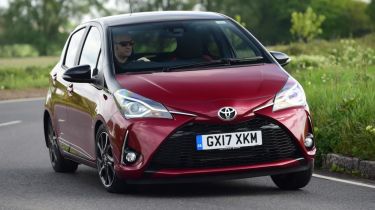Used Toyota Yaris (Mk3, 2011-2020) review - how much will it cost?
Efficiency is definitely the trump card of this little Toyota – all versions are impressively affordable to run
With the notable exception of the very costly GRMN hot hatch, running a Toyota Yaris isn’t going to be too financially taxing whatever spec you choose, with low emissions across the board. Coupled with good-value pricing and decent residual predictions, it’s definitely a purchase to please your accountant.
Prices
You could pay as little as £2,500 for a 2011 Toyota Yaris, but you’ll need to double the budget for a facelifted 2014 model. Better still, consider spending at least £7,000 on the revamped Yaris, introduced in 2017. With more than 900 new parts and revised styling, it’s a great alternative to the current Yaris.
The Yaris Hybrid holds its value incredibly well, so you’ll need to find at least £8,500 for a 2013 example. Finally, the Yaris diesel is relatively rare, so a shortage of supply means you’ll spend at least £2,000 for a 2011 model.
You can check out the latest used prices for the Toyota Yaris on our Find a Car service or value a specific model using our free car valuation tool.
Economy and CO2 emissions
The great thing about the Yaris is that all mainstream engines in the range are very economical. We'd opt for the Hybrid, if efficient (and clean) motoring is your goal; it combines a 1.5-litre petrol engine with an electric motor to great effect, claiming 60.1mpg fuel economy and CO2 emissions of just 83g/km.
Used - available now

2025 Toyota
Yaris
9,038 milesAutomaticPetrol1.5L
Cash £16,200
2025 Toyota
Yaris
14,758 milesAutomaticPetrol1.5L
Cash £14,783
2016 Toyota
Yaris
23,898 milesAutomaticPetrol1.3L
Cash £8,700
2025 Toyota
Yaris
21,085 milesAutomaticPetrol1.5L
Cash £16,490Plus, in Excel spec, the Hybrid is the most expensive car in the Yaris line-up, so you have to weigh that against the potential savings you’re going to make on the road – as well as the all-important ‘feelgood factor’ of running a car that’s kinder to the planet.
Elsewhere, the entry-level 1.0-litre petrol engine returns a respectable 49.9mpg, while the more powerful 1.5-litre petrol achieves 48mpg. In 2008, the Yaris D-4D with a 1.4-litre diesel engine was the most frugal car we tested, delivering 62.8mpg. This is against official figures of 72.4mpg and CO2 emissions of 104g/km.
For the record – and to no one's surprise, we imagine – the GRMN hot hatch is the least economical Yaris, with an official combined figure of just under 38mpg. However, if you make regular use of its full performance, you can expect to get much less than that.
Running costs
The Yaris needs maintenance every 10,000 miles or 12 months. There are three levels of service (Intermediate, Full, Full+) at £165, £295 and £355 for a regular Yaris; prices are a little higher for the Hybrid. Check-ups alternate between Silver (£110) and Gold (£190) once a car is five. These include replacing brake fluid biennially and coolant after 10 years/100,000 miles, then every five years/50k miles. Engines are chain-driven.
Insurance ranges from group 8 to 9 depending on which model you pick (although the GRMN is considerably higher), so few drivers are likely to be put off buying a Yaris by the potential cost of cover. By way of comparison, the entry-level version of the old Peugeot 208 sits in insurance group 7, and while one version of the Ford Fiesta qualifies for group 3 cover, most models sit in groups 11 or 12.
Residual values for the Toyota Yaris remain relatively strong, in spite of the plentiful numbers for sale on the UK used car market. Clearly, the reputation the car has built up for practicality and efficiency is attractive to second and third owners, too.







